El error 403 Forbidden es uno de los problemas más frustrantes que los propietarios de sitios web WordPress pueden encontrar. Este error se produce cuando el servidor deniega el acceso a una página específica o a todo el sitio de WordPress, lo que impide acceder al área de administración o mostrar contenido a los visitantes.
A lo largo de los años, hemos ayudado a miles de usuarios de WordPress a solucionar sus problemas y hemos recopilado las soluciones más fiables para este problema específico en esta completa guía.
En este artículo, aprenderá a solucionar el error 403 Forbidden en WordPress.
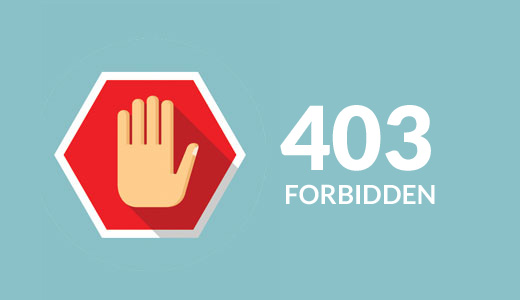
¿Qué es el error 403 Forbidden en WordPress?
El código de error 403 Prohibido se muestra cuando los permisos de su servidor no permiten el acceso a una página específica de su sitio web WordPress.
Este error suele ir acompañado del texto
403 Prohibido – No tiene permiso para acceder a ‘/’ en este servidor.
Además, se ha producido un error 403 Forbidden al intentar utilizar un ErrorDocument para gestionar la solicitud.
He aquí un ejemplo:
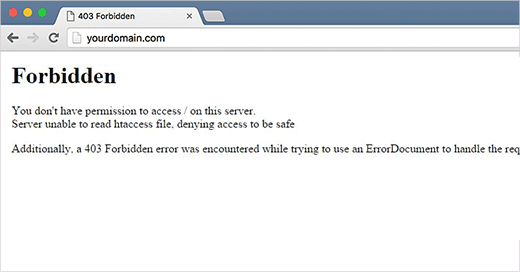
Existen diferentes escenarios en los que puede aparecer este error. Por ejemplo:
- 403 Prohibido – Acceso denegado en la página wp-admin o de administrador de WordPress.
- 403 Prohibido – Durante la instalación de WordPress.
- 403 Forbidden Error – Al visitar cualquier página de su sitio WordPress.
También puede ver “Acceso denegado” en lugar del estado completo 403 Prohibido. Alternativamente, el mensaje podría decir, ‘El acceso a sudominio.com fue denegado. No tiene autorización para ver esta página”.
Para más explicaciones acerca de los códigos de error de WordPress, puede consultar nuestra lista de los errores más comunes de WordPress y cómo corregirlos.
Ahora que conoce las diferentes variaciones del error 403, hablemos de sus causas.
¿Qué causa el error 403 Forbidden en WordPress?
El código de error 403 Forbidden aparece cuando su servidor no permite el acceso a una página específica. Hay varias causas que pueden hacer que esto ocurra.
Una causa común del error 403 Forbidden en WordPress son los plugins de seguridad mal configurados. Muchos plugins de seguridad de WordPress pueden bloquear una dirección IP (o toda una serie de direcciones IP) si consideran que son malintencionadas.
Otra posible causa podría ser un archivo .htaccess corrupto o permisos de archivo incorrectos en su servidor.
Su empresa de alojamiento de WordPress a veces puede hacer cambios accidentales en los ajustes de su servidor. Esto puede provocar un error 403 Forbidden en su sitio.
Dicho esto, veamos cómo corregir el error 403 forbidden en WordPress.
Nota: Antes de hacer nada, le recomendamos que cree una copia de seguridad completa de su sitio web en WordPress. Puedes marcar / comprobar nuestra guía sobre cómo hacer una copia de seguridad de tu sitio WordPress.
Si utiliza un plugin de copia de seguridad automática de WordPress, asegúrese de que tiene acceso a la copia de seguridad más reciente antes de seguir adelante.
Puede utilizar estos enlaces rápidos si desea omitir un método concreto:
- Method 1: Deactivate Your Plugins Temporarily
- Method 2: Regenerate Your .htaccess File
- Method 3: Correct Your File and Directory Permissions
- Method 4: Clear Your Cache and Cookies
- Method 5: Temporarily Disable CDN (Content Delivery Network)
- Method 6: Check for Malware
- Method 7: Reach Out to WordPress Support
- Learn More Ways to Solve Common WordPress Errors
Método 1: Desactive sus plugins temporalmente
Lo primero que tienes que hacer es ver si uno de tus plugins de WordPress está causando el error 403 forbidden. Para ello, debe desactivar temporalmente los plugins de WordPress. Esto incluye cualquier plugin de seguridad que pueda tener instalado en su sitio.
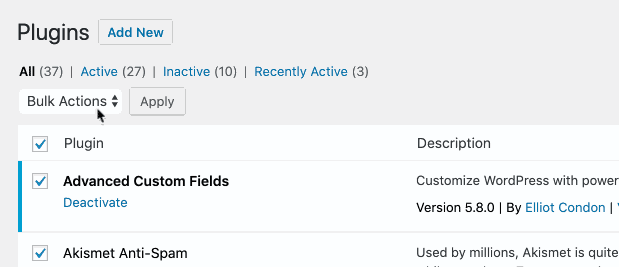
Si esto resuelve su problema, entonces esto significa que uno de los plugins en su sitio web estaba causando este error.
Puedes averiguar qué plugin estaba causando el error activando todos tus plugins de uno en uno hasta que reproduzcas el error 403 Prohibido. Entonces, tendrás que borrar el plugin problemático y buscar una alternativa o contactar con los desarrolladores para dar soporte.
Si este método no funciona, siga leyendo.
Método 2: Regenere su archivo .htaccess
A menudo, el error 403 prohibido es causado por un archivo .htaccess corrupto en su sitio WordPress. La buena noticia es que la corrección de este archivo es bastante fácil.
En primer lugar, debe conectarse a su sitio web mediante un cliente FTP como FileZilla o la aplicación Administrador de archivos de cPanel.
A continuación, busque el archivo .htaccess en la carpeta raíz de su sitio WordPress. Consulta esta guía si no encuentras el archivo.htaccess en la carpeta de tu WordPress.
Deberá descargar el archivo .htaccess a su ordenador para tener una copia de seguridad del mismo. Después, simplemente borre el archivo de su servidor. No te preocupes, tu WordPress seguirá funcionando.
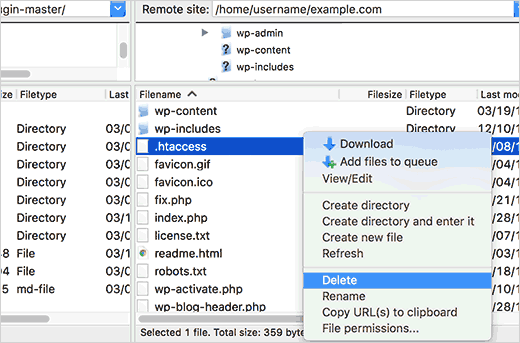
Ahora, intente acceder a su sitio web. Si el error 403 prohibido se resuelve, entonces esto significa que su archivo .htaccess estaba dañado.
Puede generar un nuevo archivo .htaccess accediendo a su área de administrador de WordPress y yendo a la página Ajustes ” Enlaces permanentes.
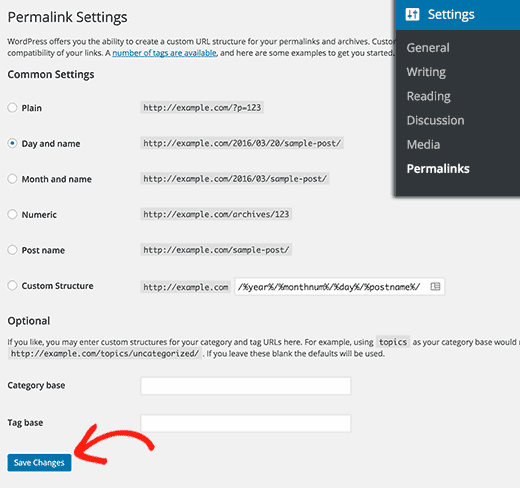
Basta con hacer clic en el botón “Guardar cambios” situado en la parte inferior de la página, y WordPress generará un nuevo archivo .htaccess.
Método 3: Corregir los permisos de archivos y directorios
Si las otras soluciones no han corregido el error 403 prohibido en su sitio, entonces la causa más probable son los permisos incorrectos del archivo.
Todos los archivos almacenados en su sitio web tienen permisos de archivo. Estos permisos de propiedad de archivos controlan quién puede acceder a los archivos y carpetas de su sitio web WordPress.
Permisos de archivo incorrectos pueden causar el error 403 prohibido. Hacen que tu servidor web piense que no tienes permiso para acceder a esos archivos.
Puedes pedir a tu proveedor de alojamiento WordPress que compruebe que tu sitio web tiene los permisos de archivo correctos. Algunos alojamientos son muy compatibles, así que no les importará y probablemente te lo corregirán.
Cambiar los permisos de archivo usted mismo puede tener graves consecuencias. Si no se siente seguro haciéndolo usted mismo, lo mejor es pedir ayuda a otro propietario de un sitio web WordPress o contratar a un profesional.
Sin embargo, si desea hacerlo usted mismo, a continuación le indicamos cómo comprobar los permisos de su directorio de archivos.
Simplemente conéctese a su sitio WordPress utilizando un cliente FTP. Navegue hasta la carpeta raíz que contiene todos sus archivos de WordPress.
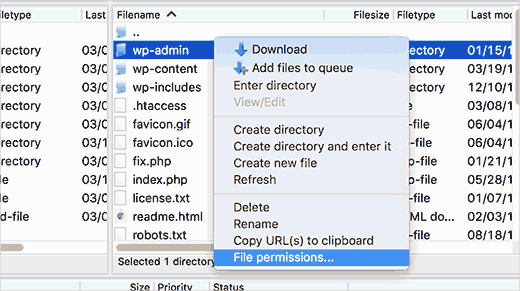
Haz clic para seleccionar una carpeta, haz clic con el botón derecho y, a continuación, selecciona “Permisos de archivo” en el menú.
Tu cliente FTP te mostrará un cuadro de diálogo de permisos de archivo como éste:
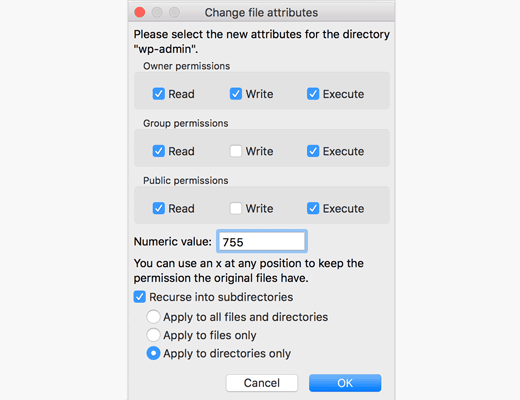
Todas las carpetas de su sitio WordPress deben tener un permiso de archivo de 744 o 755.
Mientras tanto, todos los archivos de su sitio WordPress deben tener un permiso de archivo de 644 o 640.
Puedes establecer el permiso de archivo de la carpeta raíz en 744 o 755. También tienes que marcar la casilla siguiente a “Recurse into subdirectories” y luego marcar la opción que dice “apply to directories only”.
Sólo tienes que hacer clic en el botón “Aceptar”. Tu cliente FTP empezará a establecer permisos para todos los subdirectorios de esa carpeta.
Una vez hecho esto, debes repetir el proceso para todos los archivos. Esta vez, utilizarás un permiso de archivo de 644 o 640, y no olvides seleccionar las opciones ‘Recurse into subdirectories’ y ‘Apply to files only’.
Haga clic en el botón “Aceptar”, y su cliente FTP comenzará a establecer los permisos de archivo para todos los archivos seleccionados.
Intenta acceder a tu sitio web ahora y comprueba si el error 403 forbidden ha desaparecido.
Método 4: Vaciar la memoria caché y las cookies
A veces una corrección sencilla puede ser la más eficaz. Vaciar la caché y las cookies de tu navegador, así como la caché de WordPress si utilizas un plugin de caché, puede resolver el error 403 prohibido.
Al igual que su ordenador almacena archivos temporales para acelerar los tiempos de carga, su navegador también almacena en caché los datos del sitio web. Si estos datos se corrompen, pueden causar problemas de compatibilidad y provocar el error 403.
Del mismo modo, una caché dañada generada por un plugin también puede dar lugar a que el servidor malinterprete las peticiones.
Algunos plugins de almacenamiento en caché también ofrecen ajustes avanzados que permiten restringir el acceso a determinadas páginas o perfiles de usuario. Si estos ajustes se desconfiguran por error, podrían bloquear involuntariamente el acceso a determinadas partes de tu sitio web.
Para vaciar la caché de tu navegador, puedes seguir las instrucciones de nuestro artículo sobre cómo vaciar la caché de los principales navegadores.
Si utilizas un plugin de caché para WordPress, puedes leer nuestra guía sobre cómo vaciar la caché de WordPress y consultar la documentación del plugin.
Método 5: Desactivar temporalmente CDN (Content Delivery Network)
Si está utilizando una red de distribución de contenidos (CDN ) para mejorar el rendimiento de su sitio web, es posible que esté interfiriendo y causando el error 403 prohibido.
Una CDN actúa como intermediario entre el servidor de su sitio web y los visitantes, sirviendo contenido almacenado en caché desde ubicaciones distribuidas geográficamente para lograr tiempos de carga más rápidos.
Para ver si su CDN es el culpable, puede desactivar su CDN temporalmente. A continuación, prueba tu sitio web para ver si el error desaparece.
Si al desactivar la CDN se resuelve el error, deberá ponerse en contacto con el equipo de soporte de su proveedor de CDN para seguir diagnosticando el problema.
Método 6: Comprobar si hay malware
El software malintencionado puede causar una variedad de problemas incluyendo el error 403 prohibido. Puede interferir con los permisos de archivo, inyectar código malintencionado o interrumpir la comunicación entre su sitio web y el servidor.
Para ver si hay malware en su sitio web, le recomendamos explorar su sitio web mediante un plugin de seguridad o un servicio ofrecido por su proveedor de alojamiento de WordPress.
Muchos plugins de seguridad de buena reputación ofrecen características de escaneo de malintencionados, y por lo general puede quitar estos archivos malintencionados en un solo clic.
Método 7: Contactar con el servicio de asistencia de WordPress
Si ninguno de los métodos anteriores funciona, es posible que desees buscar ayuda de otros usuarios de WordPress. Comunidades como WPBeginner Engage pueden ayudarte a ponerte en contacto con personas que hayan experimentado el mismo error y encontrar la solución.
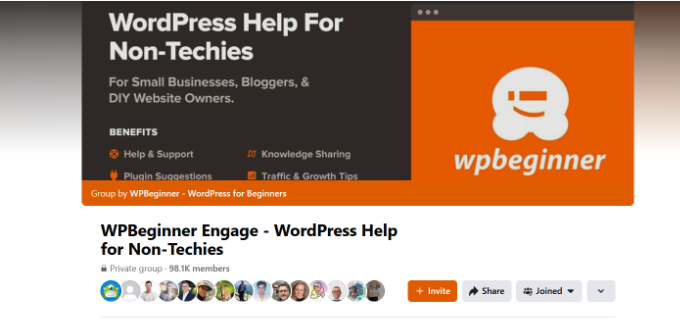
También puedes ponerte en contacto con tu proveedor de alojamiento. A veces, la raíz del problema puede estar en ellos y pueden ayudarte a solucionarlo. Puedes leer nuestra guía sobre cómo solicitar asistencia de WordPress correctamente para obtener más información.
También ofrecemos servicios de asistencia de emergencia para WordPress. Con nuestros expertos, usted puede sentarse y dejar que nuestro equipo resuelva el problema por usted, para que pueda centrarse en el cuidado de otras partes de su negocio en línea.
También puede contratar a nuestros expertos en mantenimiento de WordPress para obtener asistencia continua y que nuestro equipo se encargue de sus tareas de seguridad, mantenimiento y optimización de la velocidad.
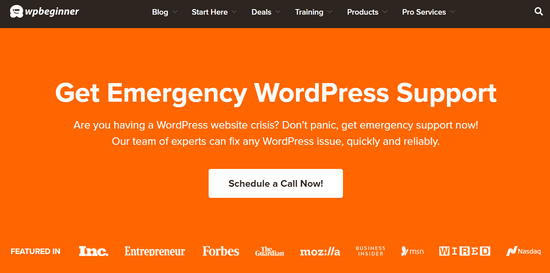
No dude en concertar una cita con nuestros expertos para saber cómo podemos ayudarle.
Tutorial en vídeo
Si prefiere instrucciones más visuales, vea el vídeo a continuación.
Más formas de resolver errores comunes de WordPress
¿Tienes otros problemas con WordPress? Quizá alguna de estas guías pueda ayudarte a resolver el problema / conflicto / incidencia:
- Cómo encontrar y acceder a los registros de errores de WordPress (paso a paso)
- Cómo corregir el error 404 de las entradas de WordPress (paso a paso)
- Cómo corregir ERR_NAME_NOT_RESOLVED en WordPress (paso a paso)
- Cómo corregir ‘ERR_SSL_VERSION_OR _CIPHER_MISMATCH’ en WordPress
- Cómo corregir el error 500 Internal Server en WordPress
- Cómo corregir el error 502 de pasarela incorrecta en WordPress
- Cómo Corregir el Error 401 en WordPress
- Cómo corregir el error 413 Request Entity Too Large en WordPress
- Cómo corregir el error 504 de tiempo de espera de la pasarela en WordPress
- ¿Qué es el error 414 Request URI Too Long y cómo corregirlo?
Esperamos que este artículo te haya ayudado a solucionar el error 403 forbidden en WordPress. Puede que también quieras ver nuestra lista de los problemas más comunes del editor de bloques y los plugins de WordPress imprescindibles para hacer crecer tu sitio web.
If you liked this article, then please subscribe to our YouTube Channel for WordPress video tutorials. You can also find us on Twitter and Facebook.




Gary Parker
None of these fix my problem as it is one page and the only way i could fix it was to rename the permalink, The page in trouble is https://example.com/blog/ and the only way i could fix it was to change it to /blog2/, any ideas?
Michael
Please somebody help me. I have two websites on the same host. I just added a third addon domain recently and installed wordpress to it through the softaculous installer.
The problem is not from wordpress, and other websites on the same host is accessible.
Please help.
Andreas Johansson
I hade one page Forbiden 403 and tryied all the steps. And now i dont have permission to login wp-admin on my site?
WPBeginner Support
Hey Andreas,
Please see our WordPress troubleshooting guide. It will help you find out the issue and then you can fix it.
Admin
Marcus
It worked like magic
Juliet Julius
Thank you so much for this article. My problem was a corrupted htaccess file. My website is now working fine.
Aleli Sanchez Mendez
I still having this problem. I tried all the steps. The problem began when I installed the WooCommerce plugin in my WordPress Site. Now in my wordpress y receive a 403 Forbidden and in my other site, without wordpress i recieived a 502 Bad Gateway error.
Please someone can help me?
Scott Munson
I discovered – after all else failed and many hours spent, that at one time (but no longer) I used Bullet Proof security. It left a stray .htaccess file in my wp-admin folder – THAT, was causing the 403 error for me. ARGH!
WPBeginner Support
Hey Scott,
Thanks for sharing, glad you found the solution
Admin
joshua jenish zibhu
how i solve this probkem…. in windows 10……
john
Thank you, it worked for me.
Oluwaseun
Thanks!
changing file permission works for me.
Yogesh
Thanks a ton. Deleting .htaccess worked for me.
JU
There has to be a fourth step. None of these steps applied. The plugins weren’t the cause. The .htaccess file wasn’t the cause. All the permissions in all files and folders are set to the correct numerical values.
Sendhil Kumar S K
Hi Friends, One Easy step will make You free from the existing problem.
1. Go to CPanel of Your Domain
2. Click to Expand public_html folder present at the extreme left of the screen.
3. Double click on wp folder present on the write side of the screen
4. Copy All files & Folders inside the wp folder
5. Move all the files & folders inside the wp folder to UP ONE LEVEL
6. Now All files & Folders are out of WP folder, hence WP folder is empty, come one level up & delete the empty WP folder
7. Now go to browser & type your domain_name.com, PERFEFETLY it will be WORKING
All the Best…if you have doubts regarding this mail me to
Also if time permits visit my site
Thank You All
Sergio Casabona
Hi, there! Thanks for this article!
I got this error, so I access with my ftp and deleted .htaccess file. I’m now able to access my dashboard. But when I go to settings and save again as you say, the error 403 comes back. What can I do?
Thank you, guys!
Josh Allen
What if I had a dedicated server, and its happening to all 43 of my sites…I just did some kind of WHM update on Bluehost, then it happened….Ive been waiting for an hour to talk to bluehost.
Ronald
Josh –
I had a similar thing happening to me here. “All of a sudden” none of my sites worked anymore.
I am hosting the sites on my own MacMini, running OS-X Server. After a night of trouble-shooting, I eventually found out that the root cause was me enabling the FTP server in OS-X Server. In there, I set folder permissions for the website root folder for “Everyone Else” to “None” (seemed a bit tricky to give everyone Read access to my sites!). Apparently one is also blocking the _www user access to the websites then…
After I changed this back to “Read Only”, my sites started working again… Pffff.
I’m now looking for a permanent solution, which is not: “Close my firewall for FTP traffic.
Hope this helps,
Ronald
Krishna Patel
This post saved my life! I can’t thank you enough for this helpful information but.. thanks a million
shah faisal
You don’t have permission to access /loading.php on this server.
Additionally, a 403 Forbidden error was encountered while trying to use an ErrorDocument to handle the request
James
The file permission option fixed it, thanks a lot.
gab
I am getting the 403 error for my page and cannot even login into WordPress because of it… I don’t know how to fix it and don’t see anyone with the same issue.
Reshan
Hi. My WordPress is handled by the hosting company itself. So I dont have root access. How can I solve this problem?
WPBeginner Support
Hi Reshan,
Please contact your hosting company. They will be able to fix it for you.
Admin
Prince
Thank you. You helped me solved my problem.
Rafael Hernandez-Padilla
Thank you, the article resolved the issue I was having on my site.
Yves
Same problem here, and ftp same result… checked in Cpanel and noticed my maindir permissions was 0000 , changed to 0755 and was fixed
Mimi
In my case, I had my website for 4 years and all of a sudden today I got this error although I did not touch the files or change any permissions. I logged into the control panel and noticed that for some reason the index.php file was missing from the WordPress root folder. I downloaded a new copy of WordPress and copied the index.php file on to the root folder of my WordPress website and the website came back!
So perhaps if anyone is getting the same error, please double check that you have an index.php or index.html file. I hope that helps.
Cian
Lifesaver – thank you! This worked for me also.
justin
Ditto…no idea why/how but the index.php disappeared while I was working on a project…I was saved a load of hassle by an automatic backup where the index still existed.
Nick
Thanks Mimi! This worked for me while the solutions in the article didn’t. In my case, the index.php file wasn’t actually missing but when I replaced the one that was there with a fresh one the site started working again so I guess it was corrupted or had some kind of other problem.
My specific error message did also mention the index.php file so that also makes sense:
Forbidden
You don’t have permission to access /index.php on this server.
Additionally, a 403 Forbidden error was encountered while trying to use an ErrorDocument to handle the request.
AMar pal
Help me my website is down.I tried all the given solutions but nothing worked…
Edgar
Nothing worked for me until I added “Options +FollowSymLinks” (without the quotes) above “RewriteEngine On”.
Doni
I did all three possible causing 403 error fixing that you informed but it still produced the error. By the way i wanted to edit footer template but when i saved / updated file it produced “403 Forbidden Access to this resource on the server is denied!”
Mimi
This is a reply to your comment on wpbegginer.com (comment quoted below)
I am not sure if you were able to resolve your problem but I would like to let you know that I got the same error today and I found that the problem was a missing index.php file from the root folder of my website.
———————————————————————–
“I did all three possible causing 403 error fixing that you informed but it still produced the error. By the way i wanted to edit footer template but when i saved / updated file it produced “403 Forbidden Access to this resource on the server is denied!””
Alexandra
Hello,
I need help, while trying install wordpress with mamp, after i did everything what i supposed to do, it showed me this error :
‘Forbidden
You don’t have permission to access /mysite on this server.
Additionally, a 403 Forbidden error was encountered while trying to use an ErrorDocument to handle the request.’
Please help me!
Vasil
Hello guys.
Forbidden
You don’t have permission to access /shop/ on this server.
I’ve tried everything and doesn’t work.
if someone can help would be great thank you.
KimD
Thanks. Great article. To fix my problem I had to do a slight variant on what was written. When I looked I found that I had two htaccess files, one in the root directory and another in the wp-admin directory. I regained access to my site by renaming the htaccess file in the wp-admin directory.
Alex
So glad you posted this, this was my exact issue! Thanks!
Kingsley Felix
Hello;
Mine happens when i want to save changes of an article by a deleted admin user
Steve
I have a user who is getting the following 403 when he tries to leave a comment:
403 Forbidden Error Page
If you arrived here due to a search or clicking on a link click your Browser’s back button to return to the previous page. Thank you.
IP Address: xxx.xx.xx.xx” (his actual IP address shows up here)
What could be wrong?
David
my problem is in .htaccess File. the passage saves my site. Thanks so much
WPBeginner Support
You are welcome
Admin
Omotayo Adeoye
Hi,
I get a ‘Forbidden’ on the wp-admin page of my website. It doesn’t say error 403 – forbidden; it just says forbidden”.
I have re-installed wordpress, checked file permissions, checked htpaccess, deactivated all plugins etc. yet it doesn’t work.
Pls what can i do!
Thanks a lot.
Ricardo
Hi! When I share my website link to facebook, the title is 403 Forbidden. Directly on my website I didn’t saw any kind of 403 forbidden message. I tried a lot of advises I found, as removing .htaccess file, desactivating all the plugins and also checked permissions. I tried to debug at facebook debugger, but the informations doesn’t change. Anyone can help me to fix this problem?
Mukesh Sharma
Hello Ricardo,
send me your website link. I can help.
Harney Cercado
Awesome! You’re a life saver!
Thanks!
Shane
This was very helpful, thank you guys very much , as we say in Jamaica “Respect”
Javier Gomez
I have many errors 403 with my images, I will take your advice thanks for the information
An apology for my bad english
Christopher Sowerby
Hi. my problem is that i can logout from the backend dashboard but i cant logout from the front end (using the bar at the top).
It seems that the nonce in the logout url is different when on the backend. Do you know why this could be? i have cleared everything out of my functions.php but it still happens.
Rameez Ramzan
Hi,
I am newbie in WordPress and Currently I am facing some problem while login WordPress Dashboard.
It’s showing 403 forbidden errors while login but on the other side my friend open similar site on their internet then its working correctly. Kindly let me know
Thanks,
Pascal
Thank you for this great post! I resolved my 403 error!!!
WPBeginner Support
Hey Pascal, glad you found it helpful Don’t forget to join us on Twitter for more WordPress tips and tutorials.
Don’t forget to join us on Twitter for more WordPress tips and tutorials.
Admin
Erik Kubica
I have similar issue, as a company on our dev server we are running much wordpress sites where to only 1 WP site i started to get 403 and only on wp-admin. 2 Days before i have lived elsewhere when it worked.
foo.bar/somewebsite/* -> 200 OK
foo.bar/somewebsite/wp-admin -> rediret to wp-login.php -> 403 err
foo.bar/somewebsite2/* -> 200 OK
foo.bar/somewebsite2/wp-admin -> rediret -> 200 OK
Ftp to foo.bar is ok, ssh to foo.bar is ok.
On “somewebsite” the WP admin is blocked only for me (all browsers, all existing incognito modes, all cache cleared incl. cookies….). For all people i have asked to try it worked without any problems.
There is nothing wrong with htaccess, wordfence was disabled from ftp (also checked the DB if there is any ban to my IP). checked the main apache2 access log over ssh where i see the 403 record.
Any idea what can be wrong?
Vinish Chaudhary
Forbidden
You don’t have permission to access / on this server.
Additionally, a 403 Forbidden error was encountered while trying to use an ErrorDocument to handle the request.
and none of above method work on this error my cpanel not showing. I read the whole article
plz, help me solve this.
thanks
WPBeginner Support
Please try these troubleshooting tips if nothing works then contact your WordPress hosting provider.
Admin
Dewlance
Uhh! WordPress wp-admin 403 error is really time killing.
I try your all tricks but still getting a error. Going to change wp-admin folder with fresh files of wp-admin files.
Maybe it will help me or other option is apache configuration or poorly mod_security configuration.
Greg
We work with WordPress everyday and recently encountered the 403 error. It was the file permissions and htaccess file that was reconfigured due to one of the security plugins. Your post on the matter was very helpful. Thanks for taking the time to post it.
WPBeginner Support
Glad you found it helpful
Admin
zulfiqar ali
dear sir my site name is my site give me error like
Forbidden
You don’t have permission to access / on this server.
Additionally, a 403 Forbidden error was encountered while trying to use an ErrorDocument to handle the request.
and non of above method work on this error my cpane not showing any files in file explorer and also not connecting via FTP client.. i read whole article
plz help me solve this..
thanks
Lindani
I cant my thinks now because of this forbidden error help please
hardik
Hi i really impress with your suggestion thanks u so much i have solve my error
Oliver
Hi, we have also been experiencing a 403 error. It first started happening when I tried to update the wp-core to 4.5. Ever since we get a 403 about once a day. I have done everything that I can think of to rectify the issue; reverted to a back-up of the site previous to the update; deactivated all plugins; checked file permissions; contacted hosts to see if our IP addresses were blacklisted; deleted .htaccess; changed theme to default 2016 the only thing that works when getting a 403 is to turn off the router wait for the IP to change and then we can access again. So it would seem to be an IP issue but I cannot find where this is IP blockage is.
Does anybody know of any other place where an IP blacklist maybe?
Thanks.
Barbara Puchala
We just had this error. A outside web designer was creating a WordPress site for us and kept getting the 403 error.
Turns out our hosting company, as part of its security measures, has its servers block any attempt to sign in with the user name ‘Admin’. I know, you would think he would know better. A change to the user name was all that was needed.
george
your typo
[due to a poorly configured security plugins]
due to a poorly configured security plugin
WPBeginner Support
Thanks, we have fixed it.
Admin